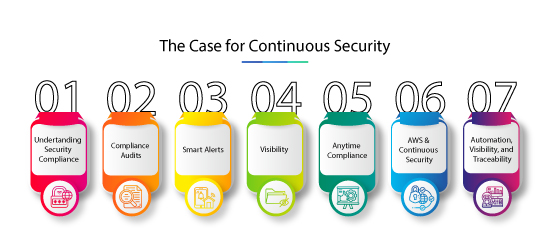Published Date :
As cloud infrastructure continues to grow and evolve, personnel needs increase, and cyber criminals grow smarter, it is not enough for a business to depend only on industry regulations for protection from security breaches. The need to be continuously aware and on guard against threats makes it imperative for businesses to take an automated approach to cloud security. Continuous security is an environment in which any vulnerability or potential threat is immediately flagged and the network security team notified, and given procedures to fix them. This approach provides a resilient barrier to your cloud environment.
The chief reasons why a business needs to adopt Continuous Security actively, include:
– Dynamic implementation
– Multiple services
– Systems and workloads operating in the cloud, and thus need central security
Understanding Security Compliance
As its name suggests, Continuous Security is a continuous process of configuring, monitoring and managing security. Every industry has regulatory bodies that prescribe security standards and recommendations to safeguard data and enhance security management. By following these norms, security compliance takes on a pre-emptive or preventive aspect in safeguarding data and systems.
Compliance Audits
While compliance audits can be a major job, it is reassuring to know that you have ownership of cloud compliance for some areas. This helps in keeping security standards up to date permanently.
Smart Alerts
Alerts let you identify anomalies that need to be investigated in real-time. This means that alerts that are too ambiguous or too confusing to follow may be skipped or missed by your team. This will lead to gaps in your security.
Visibility
As your business grows—in terms of infrastructure or people’s access to the system more data will be accessed, processed and saved. This means your cloud security too must be correspondingly ramped up. Having good visibility over the infrastructure ensures security meets compliance requirements.
Anytime Compliance
Meeting cloud compliance 24x7x364 is not as enormous task as it may seem. With a little preparation every business can achieve Continuous Security Compliance in the Cloud. Preparation here includes: knowing which compliance requirements need to be met, which warnings need to be brought up to speed, and ensuring measurability of your security solutions.
AWS & Continuous Security
AWS has set up and architected its network in a way that protects your data, identities, cloud applications, systems, etc. Since it is not feasible—or possible—for any team to check multiple elements in a DevOps model every day, AWS provides features to help organization’s meet compliance needs and continuous security, through AWS features like automated compliance protocols, granular access control, code policies, et al.
Automation, Visibility, and Traceability
The most important aspect in achieving Continuous Security in AWS environment is automation. By automating AWS security tasks you automatically reduce the possibility of manual error. You can pick and choose from a diverse menu of integrated solutions that can be implemented in tandem to automate tasks. Thus making it easier to your security team to maintain continuous security in DevOps environments
AWS lets you control your data completely—where it is stored, who is accessing it, and which resources are being used—in real time. By configuring identity, and access permissions in advance and combining it with 24×7 monitoring, you can ensure that only permitted people can have access. Further, since data moving across AWS’s global network is automatically encrypted when it exits its facility, you automatically have version details and ownership of every modification you authorize.
Not sure if your cloud security is up to the mark? Teleglobal can help.
Contact us to schedule a presentation, today.
Need help with your cloud?
"No worries! Our experts are here to help you. Just fill the form and we'll get back to you shortly!"
Our Partners


 +919356301699
+919356301699 hello@anetautomation.com
hello@anetautomation.com
